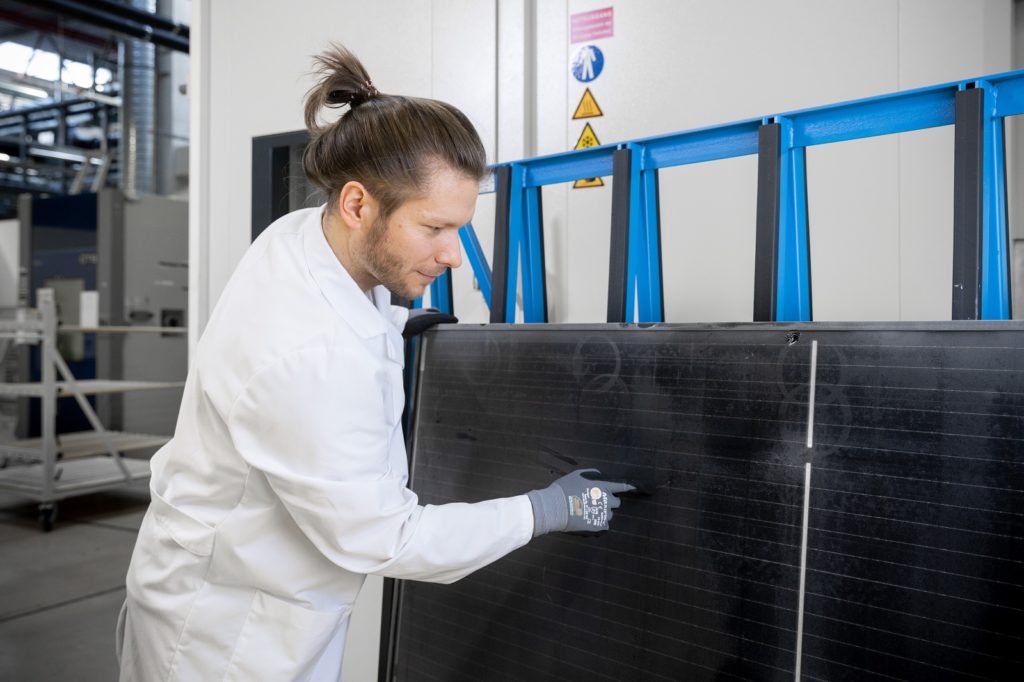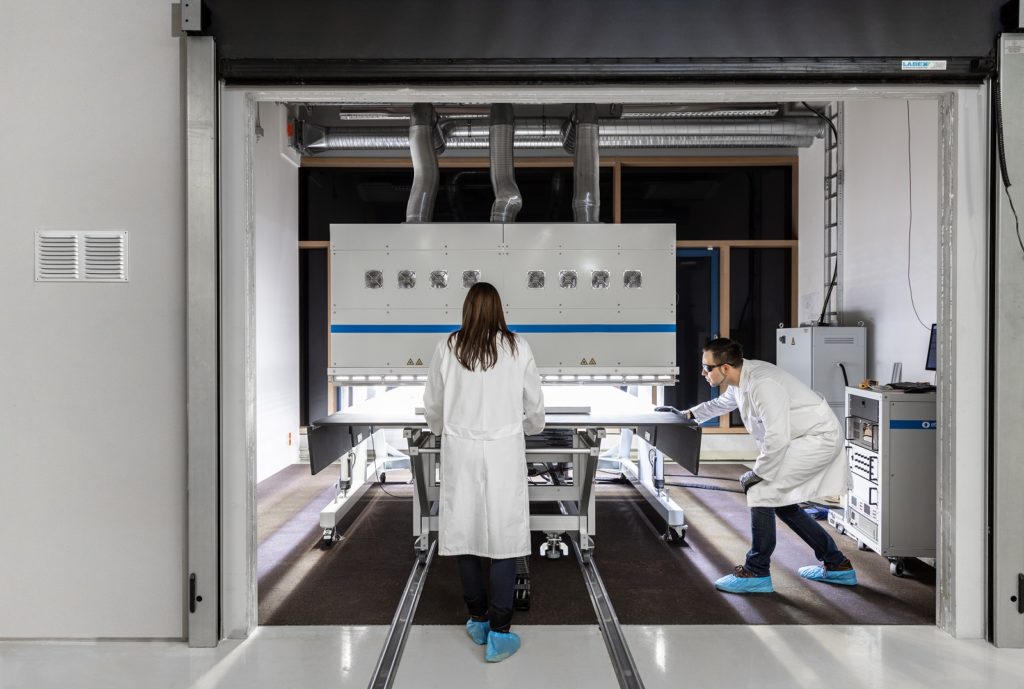
In Part I of Q CELLS’ deep dive into solar component quality, we explained both the need for, and details of, the new Quality Controlled PV program from TÜV Rheinland. Q CELLS expects this program to become a standard bearer for the PV industry, defining and reshaping best-practice in every component of the module production process.
Upholding high standards in the monitoring of material sourcing, in ensuring the deliverance of top-quality manufacturing processes, and in creating optimal testing conditions, has never been more vital. Solar’s role in the world’s energy supply continues to grow. Photovoltaics become more embedded into the fabric of everyday life with every passing month. The technology’s reliability – hitherto fully trusted largely only by industry boffins willing to bet the house on their projections of PV longevity – now finds itself under the unforgiving glare of public opinion.
Unlock unlimited access for 12 whole months of distinctive global analysis
Photovoltaics International is now included.
- Regular insight and analysis of the industry’s biggest developments
- In-depth interviews with the industry’s leading figures
- Unlimited digital access to the PV Tech Power journal catalogue
- Unlimited digital access to the Photovoltaics International journal catalogue
- Access to more than 1,000 technical papers
- Discounts on Solar Media’s portfolio of events, in-person and virtual
Or continue reading this article for free
In many ways, it’s a case of so far, so good. Not only has the exceptional growth of the PV industry forced many a climb-down in political strategy, but – crucially – has won over executives and investment funds whose eyes are keenly trained on “the next big thing”. Solar can no longer be content as a disruptive thorn in the side of big oil. Solar is now tasked with doing the heavy lifting.
With a record 184 GW of new PV capacity forecast by IHS Markit to be installed globally in 2021 – a 30% rise on 2020 – PV is now realising the dream of clean energy advocates from decades ago: of being a key ingredient in the global energy mix. Having proven its affordability – PV systems capex will continue to decline 5% year-on-year says IHS Markit; adaptability – from intelligent BIPV design to innovative floating solar projects; flexibility – low-carbon hydrogen is gaining traction and posting staggering cost reductions (levelised cost of green hydrogen is now around US$4-5/kg) thanks, in part, to solar PV; and popularity – a 2020 Gallup poll in the US found that 80% of Americans believe that the country should put more emphasis on solar energy – solar advocates and critics alike are more than happy to circle back to the topic of reliability when assessing the technology’s claims of mass appeal.
Let’s look under the hood
Critics of solar – stubbornly persistent in wilfully misunderstanding why the world would benefit from a shift away from fossil fuels – like to frequently question PV’s durability and, indeed, the entire production process. “Will the modules still even work properly after 10 years?” they ask, incuriously. “Can we trust that materials quality and reliability has been properly tested?” they ponder, disingenuously.
Unfortunately for such critics, solar aficionados ask those very same questions – and do so with an intense desire to not only find the answers, but to deliver positive ones. During January’s PV Tech TechTalk Webinar on the topic of Quality Controlled PV, a newly established certification standard, (you can listen to the recording here), Q CELLS and TÜV Rheinland received many such questions from an intensely curious, solar-supportive audience. More than 50 attendees posed questions of such intelligence and insight that it served to reassure Q CELLS that the many, many man-hours the company invests in testing modules, assessing quality standards, and monitoring production procedures, are worth it. The appetite the industry has to better understand how solar modules are produced is vast, and for a company like Q CELLS, that is uplifting.
After providing each attendee with a detailed answer to their question, we saw this article as an opportunity to further elucidate on some of the recurring themes evident in the audience’s reaction to the webinar. The most obvious starting point is to offer more insight into the Q CELLS solar module that launched the Quality Controlled PV program from TÜV Rheinland – the Q.PEAK DUO-G9, Q CELLS’ latest solar module with zero-gap technology.
“We wanted to use the Quality Controlled PV program as a platform to transparently show customers that we combine advanced technology together with industry-leading quality, and the Q.PEAK DUO-G9 is the most appropriate module for such a task,” explains Daniel Felsch-Kruse, director global QM for Q CELLS.
As with all Q CELLS modules, the Q.PEAK DUO-G9 underwent a series of stringent internal qualification, quality and reliability testing to meet the company’s own high quality demands. The Quality Controlled PV program – where TÜV Rheinland sought the insight and experience of Q CELLS, among other industry players – then represented an independent, industry-leading certification benchmark that Q CELLS could use as a tool to prove the high quality of the Q.PEAK DUO-G9.
“The zero gap technology in this module range meant an increased risk of cell cracks,” Dr. Christian Taubitz, staff expert, Global R&D for Q CELLS, said. “So in testing we had a special focus on thermal cycling and mechanical and dynamic load – as well as a combination of these stresses.” Sure enough, the first prototypes did display an increased cell crack rate after production, and in extended stress tests. “Which meant we had to improve the module design, the module production processes and also the materials that we used.” The result was the commercialisation of a higher efficiency module with an industry-leading performance in reliability tests, as evidenced by the improved 25-year performance warranty offered on G9 solar modules from Q CELLS.

Knowledge sharing and next-gen tech
Q CELLS was honoured to have played a role in supporting the creation of TÜV Rheinland’s Quality Control PV program, and strongly believes that collaboration and cooperation within the renewable energy industry is vitally important for the future health of the planet. Q CELLS embraces that same mindset across its global manufacturing and testing hubs.
The in-house module test line in Germany is one of the largest in Europe, and Q CELLS also operates other testing lines in China, Korea and, shortly, Malaysia. With a global module capacity of 12.4 GW as of the end of 2021, these multiple testing sites are necessary in order to maintain quality across the board. “A high number of modules are tested daily,” explains Taubitz. “By testing at multiple locations, this frees up space for the test line in Germany to also be used for R&D purposes.” The global testing experts, supported by the experts in Germany, operate Q CELLS’ testing lines located near to the company’s production sites, and TÜV Rheinland representatives are now on location to perform monitoring, certification and qualification tests.
This global coordination sets universal standards, and allows the German site in Thalheim to push the envelope in advanced technological research. “In Thalheim we can focus on ways to improve module efficiency, increase module reliability and develop new measurement and test procedures,” Taubitz revealed. “Advanced test methods utilised for determining material footprint quality – a requirement for component three of the Quality Controlled PV program – are only conducted in Germany,” Felsch-Kruse added.
The fast-paced nature of solar cell and module development means, of course, that testing and monitoring standards are constantly updated and adapted. The TÜV Rheinland program itself is independent of cell technology. This means that for Q CELLS, the requirements of the Quality Controlled PV program are an essential part of the company’s own milestones when developing a new technology or product. “It’s a challenge, but certainly mandatory,” Taubitz stresses. “As one of the industry’s leading cell and module manufacturers, Q CELLS has a lot of knowledge regarding cell and module failures. We know the stress factors that a cell is exposed to during its lifetime.”
New cell technology types currently being developed throughout the industry may be susceptible to new failure modes. The priority for Q CELLS is to not only develop and commercialise new, higher efficiency cell and module technologies, but to ensure that the company deeply understands how to identify, test and overcome any unforeseen failures.
“Q CELLS identified light and elevated temperature induced degradation (LeTID) in laboratory tests before the start of mass production of our Q.ANTUM cell technology (a PERC based technology),” said Taubitz. “Our experts not only analysed the failure mode, but found a solution – one which led to the world-first publication about LeTID and Q CELLS’ leading anti-LID technology.”
When dealing with new technologies, Q CELLS is well prepared. “When potential induced degradation (PID) was found on field-installed modules, appropriate laboratory tests were not available at the time, meaning the entire industry was affected by this failure mode,” said Taubitz. “In this instance, Q CELLS demonstrated its industry-leading know-how to analyse the issue and conduct a PID investigation that not only led to the publication of world-renowned papers on the subject, but also to the development of our anti-PID technology.”
“Since this technology was introduced by Q CELLS, there have been no further PID claims,” Felsch-Kruse highlighted.
Q CELLS’ commitment to pushing the envelope of quality is self-evident, and growing stronger by the day as the company strives to deliver new and improved solar technology of ever-higher efficiencies and greater reliability. “It is a never-ending project and one in which Q CELLS is proud to lead the way,” Taubitz concluded. “There are so many details to consider, but what ultimately counts for the customer is the performance of the final, finished product. We never lose sight of that.”
